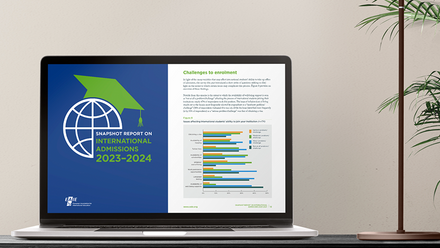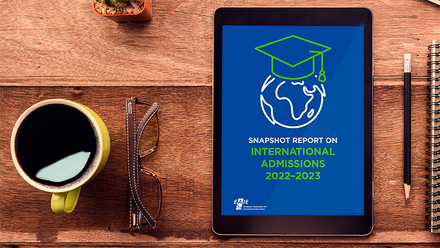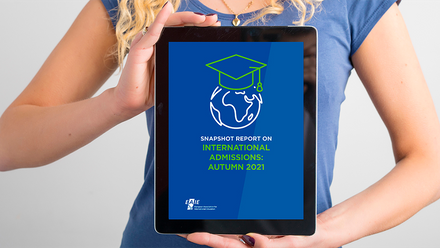Resilient international admissions: 5 lessons to carry forward

Like everyone else, the community of international admissions officers across Europe and around the world was taken by total surprise in March 2020 by the COVID-19 pandemic – which hit us in the middle of our annual application cycle. Without exaggeration, our field of work was turned completely upside-down in an instant. We were pulled from our comfort zone and in the process we learned a great deal and very quickly. With other colleagues in our institutions and across our networks, we were pulled directly into discussions about online learning and creative new approaches to mobility, all in the face of many unknowns, new risks, and ever-changing and unclear regulations. We were forced to make instant decisions in ways that we never thought possible before.
The last year has certainly been a stressful time for everyone, but for many in the international admissions community there has been an added dimension of concern about finances: university leadership were worried about losing international students and the revenue they bring. How would these losses affect our institutions and what would we be able to show for all of the investments we had made to assist students through the admissions process?
Indeed, for many in international admissions offices, the most important question was: are we still going to have international students? My experience, which aligns with a great deal of anecdotal evidence through my various networks, is that international admissions officers were doing (and continue to do) everything possible to ensure ongoing admissions, despite the obstacles presented by the pandemic. We have focused on keeping our fingers on the pulse of rapidly changing conditions and taking every possible measure to keep things moving as smoothly as possible. While we’ve all been hoping that the COVID skies would clear up quickly, the reality is that this is taking much longer than we had thought.
But, the picture is not all gloomy. A time of crisis is also a time for learning. Below are 5 things admissions officers, and more broadly our international education community, can take away from these recent experiences.
1. Expanded online offerings are changing the game
Universities now offer a much larger number of courses and programmes online, and online options are now seen as valid ways of getting a quality education. This creates many more opportunities for students, including those who could not afford some of the costs (such as housing) associated with physically traveling abroad for their education and for students who prefer to stay at home, for example for family reasons. With this in mind, many students are applying to different universities around the world. For international admissions professionals, this is adding to our workload in some ways, but also stimulating exciting new ways of thinking about what ‘success’ in recruiting new international students looks like.
2. Flexibility is key
With universities and embassies suddenly closing, and travel becoming impossible, the whole admissions process was deeply disrupted. A large degree of creativity and flexibility was needed to simply keep doing our work: making sure students were able to start their studies. Admissions officers are generally highly professional and punctual, always making sure quality standards are maintained and procedures are followed properly. In this context of great uncertainty, we managed to adapt quickly and find solutions, such as different options for language testing. This took a lot of hard work, but in rising to these challenges many of us discovered new ways of approaching our work that we can apply to the process of dealing with unexpected obstacles in the future. Some of us have also found new levels of appreciation from among our colleagues and the leadership within our institutions as we activated our expertise and out networks to deal with the admissions crisis.
3. Our network is our rock
Feeling connected to our trusted network of friends and colleagues around the world gave us the solid basis we needed to keep going: not only for quickly getting up-to-date information from different countries, but the feeling of "we are in this together" also gave us a lot of mental support. We showed solidarity and openness, being helpful to each other in any way we could, sharing information and solutions we found. If anything, this period has brought us closer together, strengthening our dedication to innovate together in the future as well. Again, this experience provides an important foundation that we can quickly drawn on when called upon to navigate future major challenges and uncertainties.
4. The students keep coming
As shown in the EAIE’s ‘Snapshot report on international admissions: autumn 2021’, the number of applications from international students did not go down in most countries. Rather, while there are some exceptions in terms of countries and institutions, the numbers of applications and enrolments by international students for the 2020–2021 and 2021–2022 academic years show signs of remaining constant or increasing. We can only conclude that students’ ambitions and their eagerness to study abroad are stronger than the obstacles they are facing now. This says very important things about the attractiveness of international study opportunities in Europe among students around the world, and the need for institutions and admissions professionals to respond appropriately and effectively to those needs.
5. Professionalism and dedication are alive and well
International admissions officers believe in our cause and are committed to operating consistently on the cutting edge, always innovating, always taking responsibility. To live out this commitment, we will need new skills in the coming years and the work of reinventing ourselves will continue. For example, we will need to invest more in the use of artificial intelligence (AI), and don’t be surprised if vacancy announcements will include more focus on IT skills, data analytics and related fields.
The last year and a half have been among the most challenging in recent history for our field generally, and for international admissions professionals specifically. However, the evidence suggests that there is ongoing and significant momentum for international enrolment in Europe. Our task now is to leverage the experiences of the last eighteen months to develop new and innovative strategies to enhance this important work, and to anticipate ever more changes ahead.






